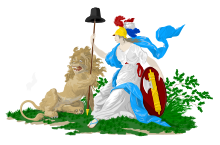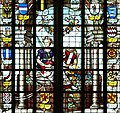الفتاة الهولندية

الفتاة الهولندية (لغة هولندية: Nederlandse Maagd) هي تجسيد وطني لهولندا. والشكل النمطي لها هو فتاة في زي روماني وبجانبها أسد، ليو بلجيكوس، وبالإضافة إلى أنها رمز للتجسيد الوطني، فقد كان هناك ثلاث رموز فتيات إقليمية وبلدات.
الفتاة الهولندية
[عدل]تم استخدام فتاة هولندية كرمز قومي لهولندا منذ القرن 16.
-
الفتاة الهولندية يهددها جندي إسباني. من جسيوس: Oorsprong en voortgang، 1616.
-
أعلام الجمهورية الباتافية.
-
فتاة هولندية في كارتون، entitled "Ons Schibboleth"، printed in De Nederlandsche Spectator، 1866.
-
Dutch Maiden atop the national monument at Plein 1813 in The Hague. From a postcard dating around 1890-1905.
-
Dutch Maiden on a design for the العربة الذهبية، by Nicolaas van der Waay.
أثناء الثورة الهولندية، كانت العذراء تمثل جمهورية هولندا became a recurrent theme in allegorical كرتون (فن).
On 25 May 1694، the States of Holland and West Friesland introduced a uniform coin design for the United Provinces، showing a Dutch Maiden leaning on a الكتاب المقدس placed on an مذبح and holding a lance with the Cap of Liberty.[1][2]
During the French occupation، the short-lived الجمهورية الباتافية adopted the Dutch Maiden as its main symbol. The symbol was depicted on the upper left corner of the Batavian Republic's flag، with a lion at her feet. In one hand، she holds a shield with the فاسيز and in the other a lance crowned with the cap of liberty.[3]
The Dutch Maiden continued to be used as a symbol after the foundation of the مملكة الأراضي المنخفضة in 1815. She was integrated into a number of 19th century monuments، including:
- the statue in the centre of Plein 1813 in لاهاي،;[4]
- the statue commemorating the Battle of Heiligerlee،[5] and
- the statue on the Nieuwemarkt in روتردام.[6]
The theme of the Dutch Maiden still appears now and again. For example، in a political song in his 1977 oudejaarsconference، comedian Wim Kan made a reference to the Dutch Maiden:
- All the geese that lay golden eggs have been slaughtered/
- The Dutch Maiden was raped by the حزب العمل الهولندي/
- She was taken to وزارة دن ييل /
- On دريس فان أغت's racing bike."
العذراء كرمز إقليمي
[عدل]Starting around the time of the عصر النهضة، it was not uncommon for a Dutch province to be symbolised by the image of a maiden، e.g. "the Maiden of Holland".
عذراء هولاند
[عدل]-
فتاة هولاند في حديقة هولاند، 1563، بريشة Philips Galle
-
نفس الموضوع يظهر بعد 100 سنة، عام 1663، في أدريان ماثام سلسلة دوقات هولاند.
الفتاة كرمز بلدة
[عدل]A "town maiden" (stedenmaagd) was sometimes used to symbolize a Dutch town، e.g. "the Maiden of Dordrecht".
فتاة دوردريخت
[عدل]On a relief on the 16th century Groothoofdspoort in دوردريخت، the Maiden of Dordrecht، holding the heraldic shield of Dordrecht، is seated in the symbolical Garden of Holland. She is surrounded by the heraldic shields of 15 cities. The same theme was the subject of a 1596 gift to the St. Janskerk in Gouda by the Dordrecht city council. From 19 to 23 July 1572، Dordrecht had been the scene of the first independent meeting of the provinces rebelling against Spanish rule.
-
Dordrecht Maiden، 1596، stained glass window designed by Gerrit Gerritsz Cuyp in the Janskerk، Gouda.
-
Maiden of Dordrecht depicted in the Groothoofdspoort in Dordrecht in 1618.
في رموز دوردريخت هذه، the heraldic shields are (clockwise from خيرتراودنبيرخ، المدينة shield on the "gate" of the garden) for the following towns: Geertruidenberg، سخونهوفن، هورن (هولندا)، فيسب (هولندا)، ليردام، ناردن (هولندا)، ماودن، ميديمبليك، Grootebroek، Monnickendam، إنكهاوزن، Asperen، هوسدن، سخيدام وفلاردينجن.
مراجع
[عدل]- ^ https://web.archive.org/web/20120319233939/http://www.muntenmuseum.nl/PDF/Staten%20Generaal%2025%20mei%201694.pdf. مؤرشف من الأصل (PDF) في 19 مارس 2012. اطلع عليه بتاريخ أغسطس 2020.
{{استشهاد ويب}}: تحقق من التاريخ في:|تاريخ الوصول=(مساعدة) والوسيط|title=غير موجود أو فارغ (مساعدة) - ^ Hubert de Vries، Wapens van de Nederlanden. De historische ontwikkeling van de heraldische symbolen van Nederland، België، hun provincies en Luxemburg. Uitgeverij Jan Mets، Amsterdam، 1995، page 183، note 9.
- ^ Hubert de Vries، Wapens van de Nederlanden. De historische ontwikkeling van de heraldische symbolen van Nederland، België، hun provincies en Luxemburg. Uitgeverij Jan Mets، Amsterdam، 1995، page 38-39.
- ^ Den Haag - Nationale Onafhankelijkheid نسخة محفوظة 28 مايو 2016 على موقع واي باك مشين.
- ^ Heiligerlee - Adolf van Nassau نسخة محفوظة 28 مارس 2017 على موقع واي باك مشين.
- ^ Rotterdam - De Maagd van Holland نسخة محفوظة 28 مارس 2017 على موقع واي باك مشين.








